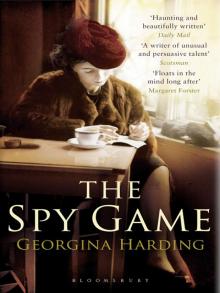- Home
- Georgina Harding
Painter of Silence Page 3
Painter of Silence Read online
Page 3
‘So that’s it. It’s true. He truly cannot hear.’
All her simultaneous hearing world rushed in on her then, all the things she heard in that moment: the spoon beaten on the pan, Mama Anica speaking, the chatter of children in the yard, a horse and the wheels of a cart coming in, the chickens and the geese, the rooks in the trees, someone calling from the door of the house. All the things that she heard that he did not hear. Yet he looked such a bright, normal boy as he took up the pan and began to beat it himself. First he beat its side with the spoon as Mama Anica had. Then he turned it over and began to stir with the spoon as if he was cooking. He picked up a walnut that had fallen on the floor and began to stir that round. Paraschiva gave him another walnut from a bowl, then a potato. She let him sprinkle some salt into the pan. She played his game yet felt very far away from him. She wanted to call him to her. He stirred the pan again, and again looked up to her for more ingredients. She looked about, found some herbs for him to throw in. There was so much that he was missing, and yet he seemed quite complete in what he was doing. Alongside her pity she felt a sudden anger. She felt it like a rejection that he did not hear or speak to her.
‘Talk to him,’ the doctor said. ‘He’s stone deaf, that’s for sure. I can’t let you hope anything else, but he can learn to read your lips. Speak to him whenever you can. Make sure you face him when you talk. Speak clear and slow. Use simple words and repeat them often. You say that it’s always been so, that he was born like this. Those cases are the hardest because the child who has never heard speech doesn’t know what it’s for. I’ve seen children a few years older have scarlet fever or somesuch, or some injury that caused them to lose their hearing, but they had language already, and they learned to lip-read so well you’d hardly know it.’
She went to the priest and stood holding the little boy by the hand at the door of his house. The priest was a big man and bent low towards Augustin. She was sure he meant it in a kindly way, but the boy took a step back in fear at his height and the blackness of his robes and bushiness of his beard. The priest gave his blessing none the less. He told her of the miracle in which Jesus made a dumb man speak.
‘But was the man deaf? Did he make him hear? The doctor says my Augustin’s not dumb but only deaf. He does not speak because he does not hear.’
The priest replied that if Jesus could make a dumb man speak then surely he could make a deaf one hear. But there were particular saints to whom she might also pray for intercession. He mentioned certain icons and relics in the churches of the region. And he asked on what saint’s day the boy was born.
It was the feast of John the Baptist, she said, the 29th of August.
‘But that is not simply the feast of John the Baptist, that is the feast of his decapitation. You must certainly pray to him, most of all. Yes, you must pray to the saints I mentioned but you might especially pray to the Prophet John.’
She did all of that. She bought fine white flour and baked cakes and plaited loaves of bread in offering, and travelled to the various icons. At each church she had someone write down her plea and left it there, and lit a candle and prostrated herself in prayer. To celebrate his anniversary when he was five, she took the boy with her on a journey to a famous church of the Baptist, a whole day each way by cart, and they slept before it. In the morning she took him into the church and lifted him up to kiss the icons and to gaze at the wild saint’s head bleeding on its platter. She prayed for a miracle. A saint who had lost his head would surely understand.
She did all that everyone said she might do but she came to believe that the doctor was right from the start. It was already too late. Augustin lived without words. His way in the world was set. Sometimes she suspected that he did not feel the need to hear or to speak. Most of his wants were simple and generally she understood and could satisfy them. On those occasions when she did not understand, his tantrums could be silent but dreadful. He punched and kicked and slewed about, and rolled over and over on the floor and drummed with his fists. Sometimes Safta was the only one who could work out what was troubling him. He has a pain, she would say, there, where you would not know it. Or simply, he is angry because Gheorghe took his pencil. Sometimes Paraschiva wondered if it was by telepathy that Safta knew. Was it that she could actually read his thoughts or was there some signal he made that only she could understand? The truth was that, growing up beside him in the days even before she herself learned to speak, little Safta had come to know him with a quick intuition as if he was the silent side of her self.
3
When Safta and Augustin were eight a governess came to teach the children in the house. Fräulein Lore came from Germany. She was tall as a man, with red hair of which she was proud and a smooth still face that was hard to read and harder to age. She came recommended as being firm with boys which was thought a necessity, with Gheorghe and Mihai born so close together and both so quick to fight. The lessons were stiff and tetchy. The nursery up beneath the roof was cold in winter and stiflingly hot in summer. The Fräulein made the children sit up straight and keep their elbows off the desks, taught the three of them to write neat letters in endlessly repeated rows, and drilled them in their times tables so that Mihai had these parrot-fashion almost before he could make the simplest addition.
The boys groaned and shifted in their chairs, and when they did some work as likely as not it would have to be redone. Often Safta worked on ahead of them or read a book to herself. Sometimes while the governess explained some tricky piece of arithmetic to Gheorghe, Safta sat across the desk from Mihai and had him read to her, pointing to each word with a pencil and reading his page upside down. When the morning’s lessons were over she ran off and took her freshly acquired skills down to Augustin in the kitchen. She got for him an exercise book with carefully spaced lines finely ruled in blue. She gave him a pencil, sharpened by Fräulein Lore to a fine point, and demonstrated the formation of each letter of the alphabet, one by one. The lines on the page dictated the height of each letter, the position of each tip and curl and tail. She imitated the governess. She stood behind him as he painstakingly followed her lines. She breathed over his shoulder as Fräulein Lore did – though her breath was sweeter. When he made a mistake she rapped the table top with a ruler, or sometimes his knuckles, and when he did well she showed his work to her mother.
Marina Văleanu was impressed with the boy’s efforts. She asked to see him and he came shyly and stood quite still before her with his head bowed and his two hands held down before him. Something in him, the muteness, the enigmatic eyes, the fine baby smoothness of his face, brought to her mind the image of her lost first son. It gave her an idea. She had been intending, anyway, as soon as she had time, to do something about promoting literacy in the village. As the children got older she meant to take on the responsibilities of her position. This deaf boy, she thought, might be the beginning of it. She suggested to Fräulein Lore that he come every morning and share the lessons.
A small wooden chair and desk were found for Augustin and placed beside the others. At first the Fräulein made no effort to teach him besides planting him there and putting paper before him and a tin of coloured crayons. The first morning he sat with his arms clamped to his sides and watched. The second morning he came in and began straight away to draw. His lines started tentatively but grew bolder as the days and then the weeks progressed. On the lined pages he drew the letters that Safta had taught him, again and again until the pages were filled. On squared pages he copied numbers like those written by the other children. He arranged the numbers horizontally or sometimes vertically with rules between them as if they were sums. On plain pages he drew pictures. He drew deliberately and precisely, with the same control of his hand as he had shown in his letters. He drew first the objects before him in the room, chairs and tables, walls and doors. Then he drew the things outside, things like trees that he could see through the window, then the things that he knew were there that he could not see, carts and ploughs and h
orses, and the car. When he had made the outlines he coloured them in with neat shading that never spilled over, but he chose the colours by whim so that the trees might be pink or blue, the sky orange and the horses green.
At first Marina was pleased with the pictures, but then she began to question his progress.
‘But what are you teaching him?’
The Fräulein pursed her lips. ‘If he’s deaf and dumb, what can I possibly teach him?’
The schoolmaster Grigorescu had long ago said much the same, though in stronger terms, to Paraschiva. Grigorescu was a thin sallow man already defeated by the children of the village. He wouldn’t take the boy on. It would be like teaching a stone, he had said. As if he didn’t have enough thickheads in the school already.
Marina Văleanu had more sense of purpose.
‘If he can write letters, then he can write words. Begin with that.’
There were many languages in the house. The family spoke Romanian first but the children were expected to acquire some proficiency also in German, French and English. Fräulein Lore spoke generally in her native tongue but gave lessons in the others. And when she began reluctantly to teach the mute boy to write she let him use whatever words came to hand. Since he had no language at all it did not seem to very much matter to which one the words belonged.
Augustin learned to write the word chat, and how to draw a cat beside it. Haus, and a picture of a house. Der Hund, das Pferd, l’arbre, le soleil, la lune, l’arc-en-ciel, rainbow. He wrote the words with as much care as an old-fashioned clerk at a high desk, so beautifully that Safta, who expected to excel in everything, was jealous. He made the drawings that went with the words. In some of the drawings the word and the object became interchangeable. He drew the schoolroom, the desks and the chairs, the wall with the map of the world on it, the door opening to the passage, and le chat slipping out around the door jamb just as the cat might have done.
This proved that he had intelligence.
‘See,’ Marina Văleanu said to the governess. ‘He understands that the writing is a symbol for the thing.’
The Fräulein had come all the way from Darmstadt to teach the children of the upper class, not to waste her time on a dumb peasant boy. ‘Yes, the words are pictures for him, but only that. He has only these few nouns, and they might as well be drawings. He cannot connect them together. He has no verbs. These words are not language to him. They are things. There is no point in teaching him. You might as well teach a bear to dance.’
‘But that’s just it,’ said Marina, who had become deeply religious since the loss of her baby. ‘He is not an animal. He is human. He has a soul. It is our duty to teach him language. Without language, how can he know God?’
The governess did what she was told. She had teaching materials sent out to her from Germany. She studied them in her free afternoons. She learned how the alphabet might be spelled out in the fingers of two hands, how the letters of which words were made divided up in different kinds of sounds, how vowels might be classified as gutturals, palatals and labials, how consonants might be open or closed, and if closed, they might, curiously enough in the circumstances, be termed ‘mute’ or ‘semi-mute’, then how patiently and painstakingly these must be taught and learned, letter by letter, sound by sound; how these letters and sounds must then be reconstructed into words. All for an odd slip of a boy with watchful eyes and a mess of dark hair on his head. His mother was a servant and his father seemed to be no one at all. She didn’t see the point.
The boy couldn’t see the point either. But it was his habit to be amenable so he smiled his fine-lipped smile and drew the letters she had taught him before. He drew the room. He drew the Fräulein’s hat without her head. He drew her, a tall rectangular form with a dress that buttoned all the way up to the collar and all the way down, a squared face above it with orange hair and two narrow eyes and a downturned line for a mouth. He drew the map on the wall, in such detail that each continent, and even the bigger islands, Iceland and Madagascar and the chain that formed Japan, were clearly recognisable. He drew the heading Le Monde, serifs and all, precisely as it appeared in the typeface.
She took his picture away.
She held his exercise book in the air before his eyes, then slammed it down on the bare desktop before him.
On a clean page she drew the single capital letter ‘B’.
She put the pencil into his hand and took hold of it in her long white fingers and drew the letter once more, making the sound of it as she did so.
Then the letter ‘u’. Then ‘c’, and ‘h’; the sound of the two combined.
It took sympathy and enthusiasm, the textbooks said, to teach the deaf to speak. It required kindness, affection, individual rapport, long intercourse. Such intercourse was hard when cold little eyes looked out at one day after day from a face blank with incomprehension.
‘Buch,’ she said, the explosion of the word so close to his face that he felt the faintly vegetable blast of her breath. She bent lower. She took his face in her hand to make him look at her, digging her fingers deep beneath the cheekbones, but he dropped his eyelids and held them down. She squeezed his lips into the form for Buch. That was what the experts told her to do. The oral method of teaching the deaf to speak. You first demonstrate yourself, and then show them how it feels: holding their lips to shape, pushing their tongues in place, holding their hands on the vibrations of the larynx and before the plosions and exhalations of breath.
His teeth clenched. With her other hand she held his nose so that he could not breathe. His lips finally spat out the opening consonant with a spray that showered her cheek. Her pale face went red. Her fingers dug in harder. The boy went all tight for a moment, then suddenly lunged and writhed himself from her grip, and fixed his teeth into her arm.
The other children watched in astonishment, the boys with a gleeful vengeance dawning on their faces, Safta angry as she would have been for an animal mistreated. Augustin ran out. The open door gaped on the black passage where he had gone and the Fräulein turned about to face them.
‘Get back to your work, all of you.’
Safta stood up. ‘Fräulein Lore, I’ve finished my work.’
‘Well memorise this poem then.’
She felt the hurt deep down in him, the incomprehensibility of it. She stared at the governess’s arm where she had rolled back her sleeve to expose the wound. She hoped to see blood where he bit but there were only white indentations.
‘What do you think you’re looking at, Elisabeta?’
‘Nothing.’
‘Nothing?’
And the Fräulein sent her to her room.
She found him in the stables. As soon as the Fräulein closed the door to her room, she climbed out of the window. There was a piece of flat roof above the verandah, an aged wisteria with branches she liked to think were tangled pythons. She climbed out and down, and ran to the stables. She knew that was where he would be. The stables were shady in summer and warm with bodies in winter, and nobody bothered him there but he had the horses for company. For him horses must be not very different company from people. Sometimes he climbed up and sat on the high iron hayrack in the stalls where they nudged him with their soft noses and their hot breath. Sometimes he went to the loft above.
He liked to sit with his back to a wall. That meant no one could come up behind him without his seeing. He was sitting in the far corner of the loft where the sunlight could not reach. She could barely see him but he would see her coming at him out of the light. She heard a dull thudding sound as she came up the ladder that was not like the thuds made by the horses in the stalls below. He was banging his head on the wall, but slowly, in such a way she thought that he would feel a hard sensation but not a pain, and yet it hurt her just to see it. Stop it, Tinu. He did not stop. He did not seem to feel the hand she put out to calm him. So she grabbed him firmly by the shoulders and pulled him, pulled hard so that he moved at last and came with her into the light, before the h
igh open door of the loft where the hay was pitched in. Usually he liked it there, where there was a long safe sniper’s view of the yard and the drive and comings and goings. A shaft of sunlight, golden hay, motes dancing; but he sat dully, arms by his sides, eyes to the floor. He would not look up, even for Safta. He had this ability, that when he did not look the world did not exist.
She took one of his hands in hers. He let her take it, hot, limp, passive.
She heard the rustle of hay, the snort of a horse, the sound of a car in the distance.
She resolved to teach him herself. Ti-nu. First of all she would give him his own name. Other words could come later. She lifted the back of his hand close to her lips.
A light ‘Ti’ spat from between her teeth, the first sound of the first word. The soft blow of ‘nu’. There.
He felt it. He raised his head and looked into her eyes. And just as he did so, she looked away.
In Safta’s world there were sounds, layers, distractions. There was more than Tinu.
There was the sun shining beyond the loft door.
The glint of a car coming between the trees.
There was the moment that was occurring inside the loft but there was also the moment that was occurring outside, all the moments there. A car coming to a halt outside the house, a voice calling that was her father’s, a single note of her mother’s voice coming from the house.
Papa! She raced down the ladder, out into the sunshine.

 Harvest
Harvest The Gun Room
The Gun Room Painter of Silence
Painter of Silence Land of the Living
Land of the Living The Spy Game
The Spy Game The Solitude of Thomas Cave
The Solitude of Thomas Cave